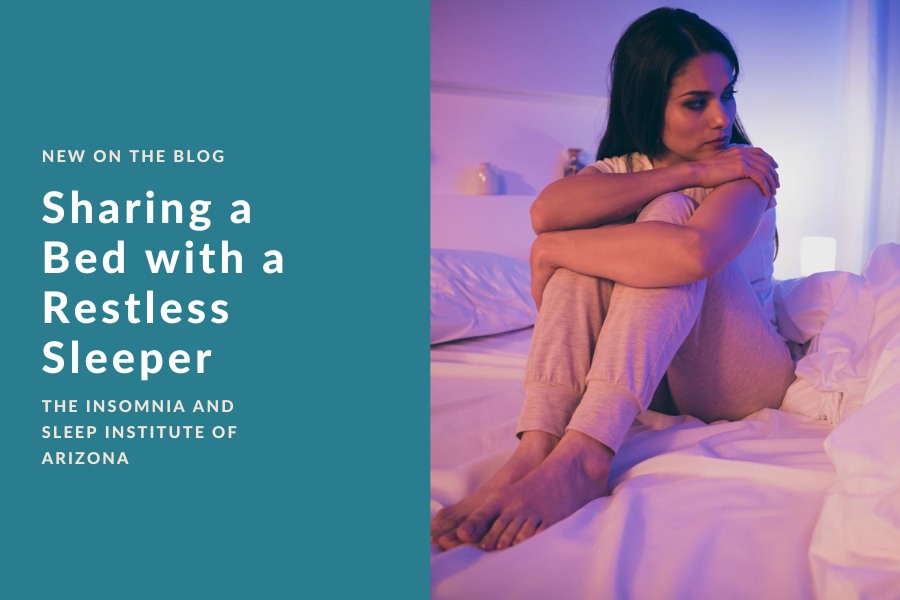When you have a sleep disorder, it’s not just you who struggles to get the rest you need. The person you share a bed with is also going to be sleep deprived and, ultimately, this can put a strain on your relationship. And if you’re the one sharing a bed with a restless sleeper, you already know how exhausting it can be. In some cases, the solution is to have separate beds or bedrooms. That works well for some couples, but not for all. Instead, the restless sleeper can work with a sleep expert to identify the root cause(s) of the issue so that everyone can get the Zzz’s they need.
Restless sleep in itself isn’t a sleep disorder. Rather, it’s an overarching term for a number of behaviors exhibited while sleeping. All of these behaviors can prevent a person (and anyone sharing a bed with them) from getting proper rest. This can range from tossing and turning to sleep-talking and teeth grinding. RLS, or restless legs syndrome, can also fall under this category. Since every type of restless sleep is different and may be triggered or caused by different factors, figuring out the diagnosis and cause first is key.
RLS Emphasizes the “R” in “Restless”
RLS is just what it sounds like. Typically, patients say they feel like there’s a burning or itching sensation in their legs. These symptoms don’t only happen at night, but they often get worse in the evening. Of course, when you feel like this, it’s very difficult to fall asleep and stay asleep. RLS can lead to twitching, jerking, and kicking. Understandably, sufferers of RLS are tired when they wake up, even when they are in bed for what seems to be an adequate amount of time. Their bedmates will be tired, too.
Nobody is certain what causes RLS and there might be different reasons for it. One theory is that it’s due to low iron and dopamine levels. It might also be caused by central nervous system abnormalities or could be a side effect of certain medications (specifically antidepressants). Alcohol, nicotine, and caffeine can trigger RLS in some patients. Those who are pregnant, have diabetes, or Parkinson’s are also known for presenting more often with RLS.
When Your Partner is a Restless Sleeper
If you share a bed with someone who’s a restless sleeper, no matter the cause, it’s important to speak up. Oftentimes, restless sleepers don’t realize they’re moving so much in the night. There are many sleep disorders that are “discovered” by partners rather than the patient themselves. Sleep disorders all vary, but bear in mind that RLS is not positionally dependent. In other words, if you make them change position, that isn’t going to help.
Also, it’s not going to be dangerous to wake up your bedmate if they’re a restless sleeper. It also won’t “disturb” their sleep since they aren’t getting quality sleep anyway. It’s important to see a sleep expert when you’re not getting adequate sleep, but before your appointment you can also work together to limit common triggers like caffeine before bed. Establishing a collaborative positive sleep hygiene routine before bed can also be helpful for everyone. A little light exercise, such as taking a walk, before bed can be helpful to calm many people. Otherwise, working with a sleep doctor to establish best practices can complement other professionally-mandated approaches to addressing restless sleeping.
Bed Matters
Your bed and the mattress can play a big role in sleep quality for all. Memory foam mattresses can be a great tool to help the person without restless sleep get the sleep they need. This minimizes movements from partners. A sturdy frame and mattress are important, too. Pillows can be an excellent tool to create space between partners, and a pillow between the legs can reduce movement. A lot of people who sleep with a restless partner find that having separate blankets can be helpful, as can weighted blankets, to provide counter-stimulation.
Your sleep doctor can help you pinpoint treatments and create a customized sleep hygiene routine. Triple board-certified Dr. Ruchir P. Patel works with patients who are challenged by all types of sleep disorders including RLS. To schedule your consultation with a sleep expert contact The Insomnia and Sleep Institute of Arizona today by calling the office, starting a chat, or completing the online contact form right now.





